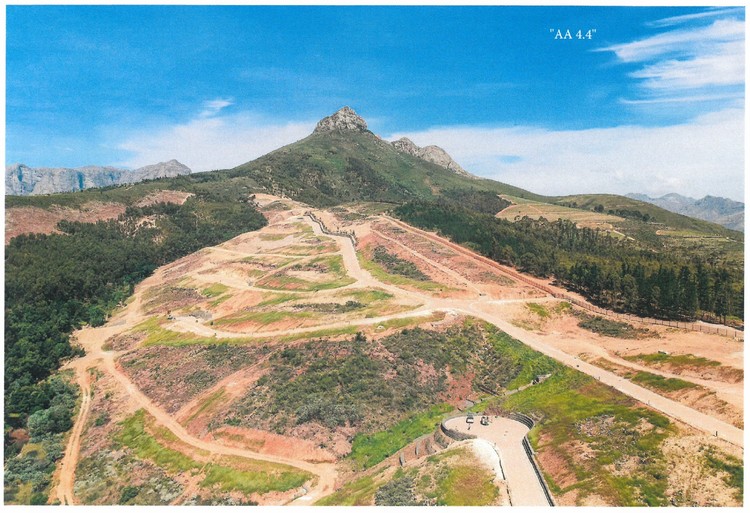Developer of R300m Stellenbosch housing estate fights back
Botmaskop Fynbos Estate says a court interdict stopping construction will be “catastrophic”
Infrastructure work on the R300-million Botmaskop Fynbos Estate, outside Stellenbosch has already been completed. Photo from an appendix in the respondent’s court papers.
- A R300-million luxury Stellenbosch housing estate will be doomed if a temporary interdict is granted, says the developer.
- The Stellenbosch Interest Group (SIG) has applied for a court interdict to stop construction of the Botmaskop Fynbos Estate, which it says will destroy the site’s environmental integrity.
- The developer of the Botmaskop Fynbos Estate has asked to submit a supplementary affidavit with “new financial information”.
- But a lawyer for SIG believes the “doomsday scenario” described by the developer is being overplayed.
The developer of a luxury R300-million private housing estate on the mountain slopes just outside Stellenbosch says the project will be doomed if a temporary interdict is granted.
But the Stellenbosch Interest Group, which applied for the interdict, says that the environmental integrity of this important site will be “forever lost” if the development of the Botsmaskop Fynbos Estate is allowed to continue.
Wouter Roux, chief executive of the Botmaskop Fynbos Estate, is applying to update the case record with “new financial information”.
Bulk infrastructure services like roads and water and sewerage reticulation for the exclusive estate have already been completed. Only an estate clubhouse is outstanding.
Roux wants the court to accept new evidence relating to the company’s financial affairs, to the effect that the company owes about R115-million to a bank and an engineering company that installed bulk services infrastructure. Repayment is due by 31 May.
He says nine plots in the Botsmaskop development have been provisionally sold to one buyer for just over R191-million, which is sufficient to cover the company’s debts. The largest (2,735 sq m) of these nine properties fetched more than R36-million, and the smallest (1,020 sq m) went for R14.95-million.
But the sale will fall through if the application for an interim interdict on construction is granted, Roux says, with devastating financial consequences for his company.
“If the interim interdict is granted, the transfer of the erven purchased will fall through, and Botmaskop will be left in a position where it will be unable to settle its debts owed to ABSA [bank] and ASLA [engineering company],” he said.
“It is not necessary for me to expand in further detail on what is likely to happen if Botmaskop is unable to settle these debts as and when they become due for repayment.”
Roux’s affidavit, dated 24 March, is being opposed by the Stellenbosch Interest Group (SIG), which accuses him of making “partisan and self-serving allegations” which are tailored to enhance his prospects of resisting the interdict.
The group’s lawyer, Johan van der Merwe, argues that Roux’s latest filing is “impermissible”.
He says the rules of court are that only three sets of affidavits are permitted. “In exceptional circumstances, a party could apply for leave to deliver a fourth set of affidavits; but a party desirous of doing that is seeking an indulgence and must show special circumstances,” argued Van der Merwe.
Botmaskop had already sought, and effectively been granted, an indulgence to deliver its first answering affidavit, and three accompanying affidavits, on 20 January 2025, said Van der Merwe.
SIG still needs to consider and interrogate Roux’s claims of the company’s “allegedly calamitous financial consequences”, he said.
“From what SIG and I can ascertain, the doomsday scenario portrayed by the fourth respondent is, at best, considerably overplayed… The simple point in any event is that this is a one-sided version advanced by a party seeking to further its own interests.”
He said the application to file a further affidavit was an “abuse of process” and should be “dismissed with costs on a punitive scale.
The interim interdict application is being brought by SIG as Part A of its challenge that, if successful, will be followed by Part B – a full review of the Botmaskop development and its various authorisations.
On 17 March , presiding officer Judge Melanie Holderness asked the parties to address a brief note to the Court as to whether SIG should be required to furnish an undertaking, underwritten by the necessary guarantees, to pay any damages that Botmaskop could incur if, after being granted interim relief in the form of an interdict in Part A, it was then unsuccessful in the Part B challenge.
Support independent journalism
Donate using Payfast

Don't miss out on the latest news
We respect your privacy, and promise we won't spam you.
Letters
© 2025 GroundUp. This article is licensed under a Creative Commons Attribution-NoDerivatives 4.0 International License.
You may republish this article, so long as you credit the authors and GroundUp, and do not change the text. Please include a link back to the original article.
We put an invisible pixel in the article so that we can count traffic to republishers. All analytics tools are solely on our servers. We do not give our logs to any third party. Logs are deleted after two weeks. We do not use any IP address identifying information except to count regional traffic. We are solely interested in counting hits, not tracking users. If you republish, please do not delete the invisible pixel.

